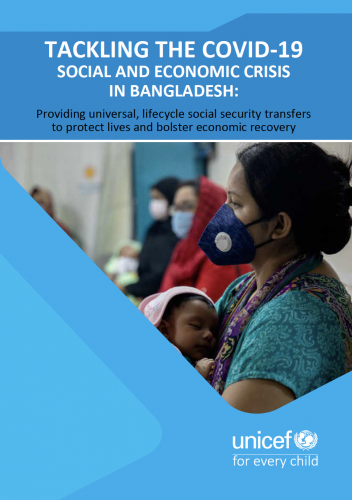 This paper is the summary report of a study commissioned by UNICEF Bangladesh to assess the economic fall-out of the COVID-19 pandemic in Bangladesh, evaluate the Government’s social protection response to the crisis and propose an alternative social protection package to protect citizens and promote economic recovery. The study is the result of a collaboration between Development Pathways, UNICEF Bangladesh and the General Economics Division of the Bangladesh Planning Commission to help inform the Government’s Country Programme Document preparation.
This paper is the summary report of a study commissioned by UNICEF Bangladesh to assess the economic fall-out of the COVID-19 pandemic in Bangladesh, evaluate the Government’s social protection response to the crisis and propose an alternative social protection package to protect citizens and promote economic recovery. The study is the result of a collaboration between Development Pathways, UNICEF Bangladesh and the General Economics Division of the Bangladesh Planning Commission to help inform the Government’s Country Programme Document preparation.
The study finds that, as a result of COVID-19, Bangladesh is likely to experience a recession for the first time since 1975, with Computable General Equilibrium (CGE) analysis suggesting that the economy may contract by 11.6 percentage points, resulting in a deficit of 3.4 per cent for 2020. This will have devastating impacts for citizens: the study’s microsimulations find that the average income of households could fall by 19 per cent during the crisis while CGE analysis indicates that the national unemployment rate may climb to three times higher than what it would have been without COVID-19.
The Government’s initial response represented a promising start but, now the full scale of the crisis has been revealed, the Government might consider an additional investment to complement existing measures. This paper proposes that the Government establish a system of emergency, lifecycle universal transfers for all children, older people and people with disabilities over a period of six months at a cost of 2 per cent of GDP. The paper shows, using a series of micro-simulations, how the proposed package would reach 94 per cent of the population and provide incomes that are 19 per cent higher than a ‘without COVID-19’ scenario and 50 per cent higher compared to their-post-crisis income: a very significant – and, likely, very popular – impact. The proposed schemes would also mitigate the potential reduction in national GDP of 3.4 per cent, reducing the severity of the recession to 1.8 per cent, almost a 50 per cent reduction, and create around 2 million jobs.
As in all other countries, bold, ambitious and creative thinking is required at this moment of great crisis. It may be challenging to find funding for an effective fiscal stimulus, but it would be a strategic investment, since the benefits to the economy and families would be high. Establishing a fiscal stimulus based on universal, lifecycle transfers should be seriously considered as an option by the Government of Bangladesh as it assesses how to facilitate national economic recovery.
Read the paper here.
Read more like this:
Publication: What has the COVID-19 crisis taught us about social protection?
Podcast: The impact of COVID-19 on child poverty in Indonesia
News: Social Protection – Paving the Way Towards a Happier post-COVID-19 World?




It is very informative summary , v.intersted to read reportWhich reflecting the experience of Bangladesh
my question about the impacts of Covid19 on women, the informal sector and what are the role Social protection and emergency system to mitigate the socioeconomic impact of Covid19 on women and labour formal and informal.
Thanks